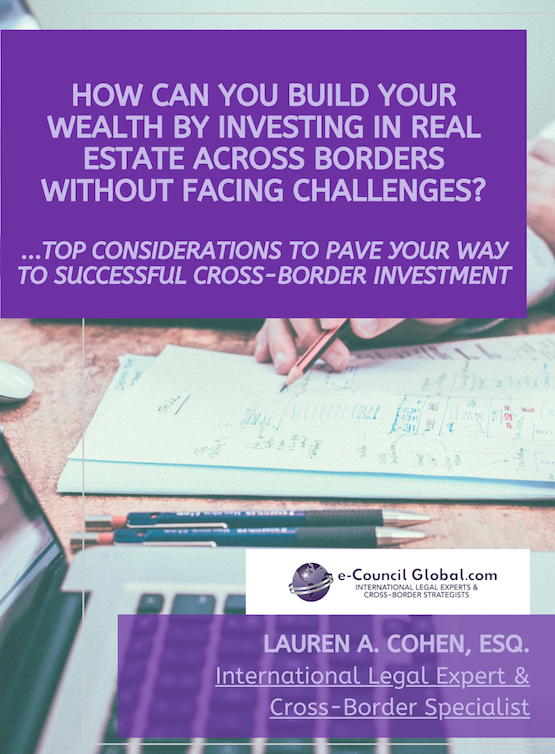Are you a Canadian investor with an eye on the red-hot U.S. real estate markets?
If you are, break out the Tylenol, because complicated legal and tax issues can give you a headache before you’ve even started!
Our lead attorney, Scott Smith, recently met with Canadian real estate investing coach David Dubeau to discuss the issues Canadian investors face when investing in the land of the Yanks. Scott has a lot of advice in another article, [[LINK]]] but in this article we’re going to look at the “investment checklist” Lauren A. Cohen introduced during the meeting.
You can check out the talk between Lauren, Scott and David below, or keep reading to get a free download of Lauren’s Eight Steps to Successful Real Estate Investment Across Borders.
Lauren’s checklist is designed to ensure success when you're investing across borders. These elements are interconnected. That means you shouldn’t focus on one and ignore the others.
Here are her tips for Canadian investors looking to make a play in the U.S.
Real estate is always about “location, location, location,” right? You’ve heard that one a million times, as have we all. But you need to truly understand the reasons to select a particular location over another.
Where in the U.S. should you invest? Are you looking at one city or region or multiple areas? Why?
Just as in Canada, there are hot areas and not-so-hot areas. You’ll need to look into state and city tax and zoning considerations before making your play.
Your coach/mentor (see the last tip) will help you find your way so you don’t waste time looking at properties in areas where you’re likely to fail.
Need tax help? See our article How Are Canadians Taxed If They Invest Or Do Business in The United States.
Lay out your goals in the beginning. Where do you want to be in three months? What about in three years?
If your short-term goals do not match your long-term goals or if you don't consider your long-term goals at the beginning of your journey, you're going to end up in a world of hurt.
Here’s an example of what we mean: If you invest in your personal name because you found a good deal and want to act fast, you may very well realize down the road that you should have set up the appropriate asset protection structures first (often a limited partnership for Canadian investors). Then you may have to go back to square one and fix everything.
A failure to plan is a plan to fail!
 Tip #3 Know Which Property Types To Target
Tip #3 Know Which Property Types To TargetWhat types of properties should a Canadian investor look at and why?
You have a lot of options to consider: Vacant lots. Residential. Multifamily. Commercial. Industrial. Mobile Homes. Retail. Real Estate Investment Trusts (REITS). All of these could potentially qualify you for immigration status (though REITS have to be set up very carefully to qualify).
Refer back to your short and long-term goals. Here again, your coach should be able to offer guidance, as there aren’t really any one-size-fits-all solutions.
“As soon as you're investing in multi-family properties with five or more units, you could be ready to invest in a commercial building, and commercial financing is a little easier to come by because it's not only based on your credit score,” Lauren says.
“In the U.S., unlike in Canada, your credit score dictates everything. It’s like the be-all and end-all. And when you're dealing with a commercial property it's also based on the returns on that property. You're going to show tax returns—kind of like buying a business. So it's all about how creative you can be when it comes to financing.”
Do you need an LLC, a corporation, or a partnership?
“From a pure asset protection standpoint, it doesn't matter what's happening on the Canadian side of things,” Scott says. “So if you already have a Canadian tax treatment that you like, the Limited Partnership structure is going to be the right structure on the U.S. side of things for you to then channel into whatever Canadian asset holding company you have.”
A lot of Canadians like to joint venture with other Canadians who already have properties in the U.S.—especially if their partners already have access to financing.
Maybe you want to create a real estate fund. Maybe you already have partners that want to invest with you. You may need to bring in a securities attorney, but there is a way forward that is right for you.
Can’t find the way forward? Then you need to … wait for it … Discuss your needs with your mentor. You may also visit DavidDubeau.com if you need help finding other capital sources.
Canadian investors can apply for a mortgage with an American bank or with Canadian financial institutions with operations in the U.S. You’ll probably have to show your passport, international credit report, employment history, residency verification, tax submissions, and proof of down payment.
Generally, dealing directly with Canadian banks means better mortgage rates. Think about it: Canadian lenders are naturally more comfortable lending to Canadians. A Canadian bank with U.S. operations will often approve your financing quickly and relatively painlessly. These would include Royal Bank of Canada (RBC) and Bank of Montreal (BMO).
What about your investing strategy? There are a lot of different strategies: the BRRRR Method, flipping, the buy and hold method, wholesaling … Some of these qualify for visas and some of them don't. Again, that's why your short and long-term goals are so important. Do you want to buy properties outright? Do you want to buy them “subject to”?
Side note: Everybody wants to buy “subject to" mortgages and they're going to be available in a big way in the next year. Why? Because forbearance is going to come due. Forbearance was implemented in the U.S. so mortgage holders could flip payments to the back end of their payment schedule. Any COVID-related pause on mortgage payments is ending and some property owners are simply not going to be able to pay their mortgages.
Do you need a visa to invest in the U.S.? Does getting one mean you have to spend a lot of time in the U.S.?
Getting a visa is often about giving you options. Just because you get a visa does not mean you have to move to the U.S.!
That's why Lauren loves Treaty Investor (E-2) visas, which are for citizens of countries with which the United States maintains treaties of commerce.
The Treaty Investor visa is based on a substantial investment in a non-marginal business. It gives you, the private investor, the flexibility you need. With this visa you're never going to have a problem coming and going across the border.
But again, you don't have to move. You can remain a Canadian taxpayer and resident. Or you can be a resident of another country and stay in the U.S. on an E-2 visa from Canada.
You have to have an “active” business to qualify for a visa. You have to figure out how to turn what's usually considered a passive investment (real estate investing) into an active business.
You need to be at least 50 percent owner in the company making the investments. You have to show that you have boots on the ground if all you're doing is becoming an equity partner in the company.

See below to get your free copy
Lauren says her favorite words are, “Stay in your lane.”
Don’t try to play realtor, lawyer and accountant. Put together a team that can guide you, help with due diligence, analyze the price comparisons, and perform deal analysis. It's important when you're working with people on cross-border deals that it's not their first rodeo.
You may be an experienced real estate investor, but it’s important that you (and your tax and legal advisors) know the differences. Dealing with Americans is different than dealing with Canadians. Not getting the right advice is going to end up costing you more than you will pay to get the guidance you need.
Make sure your team members are vetted and reliable. You need to think about immigration and securities. You need Canadian counsel to make sure that your estate in Canada is protected. Someone will have to help you with taxes on the CRA side and the IRS side.
This can be overwhelming if you don’t have help. That’s why you need a coach.You need somebody that understands everything on both sides of the border. You need somebody that has been down this path, someone who can guide you. Otherwise you’ll invest haphazardly and without a strategy.
Start with our investor quiz and we’ll help you put together the right team for your goals—a team that will evolve as your needs change.
“Without a professional team, investors will get set up right for what's going on at a specific time and point in their life. They don’t think that anything might change ... because they don't know what triggers different considerations,” Scott says.
“If you have a limited budget, that's fine. Just budget out an hour per quarter to meet with your team. It will only cost a few hundred dollars or whatever the case may be, and it is going to potentially save you tens of thousands of dollars.”
In other words, as Scott says, you should avoid tripping over pennies on your way to dollars and you’ll be set up for long-term success.
Before you get a coach, you can get a guide. This article is a very basic overview of Lauren's popular guide called Eight Steps to Successful Real Estate Investment
Across Borders. It will help you figure out your next step.
It’s a $47 value, but if you use the special code for Royal Legal Solutions readers, you get it for free. The code is REI4FREE.
Lauren, originally from Toronto, is founder and president of e-Council Global and is a cross-border strategist experienced in both law and real estate. She hosts a podcast, Investing Across Borders and works with us to help Canadians looking to invest in U.S. real estate.

Scott Royal Smith is an asset protection attorney and long-time real estate investor. He's on a mission to help fellow investors free their time, protect their assets, and create lasting wealth.

Ready to know more than your attorney? Join our community platform where you'll get immediate FREE access to all our best educational resources for real estate investors. Including 8 Masterclasses, group mentoring replays, and much, much more.
Join thousands of real estate investors in all 50 states as they enjoy exclusive content, special promotions, and behind-the-scenes access to me and my guests. No spam, ever. Just great stuff!
